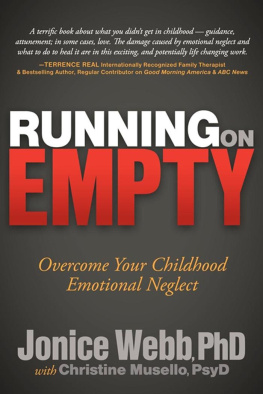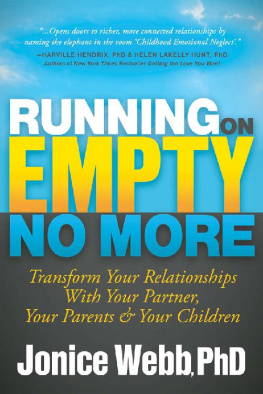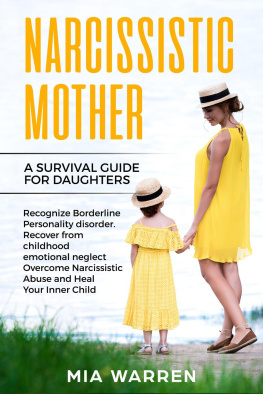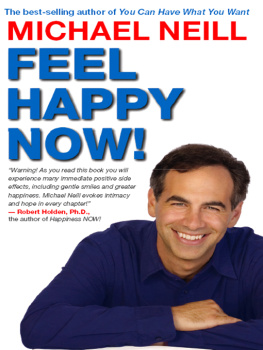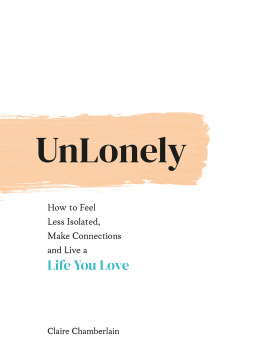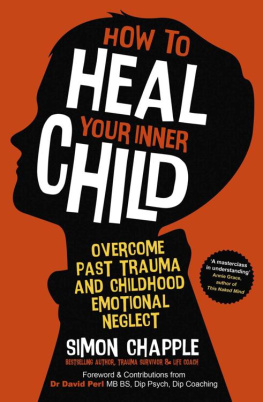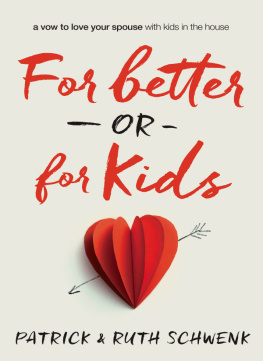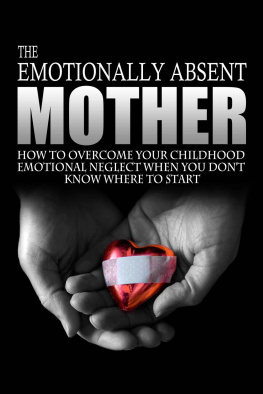RUNNING ON EMPTY
Jonice Webb has written a terrific book about what you didnt get in childhood - what wasnt there that should have been: guidance, attunement; in some cases, love. The damage caused by emotional neglect and what to do to heal it are the subjects of this exciting, readable, and potentially life changing work.
Terrence Real
Internationally Recognized Family Therapist & Bestselling Author
Regular Contributor on Good Morning America & ABC News
In a compelling and articulate way, Running on Empty shines an important light on the emotional legacy passed down to us from our parents. It helps make clear how the parenting we receive as children affects us emotionally and socially in adulthood. In a rich, warm, empathic voice, Dr. Webb speaks directly to us, helping us identify our emotional roadblocks, and providing a path through them.
Jeffrey Pickar, Ph.D.
Clinical Instructor in Psychology
Department of Psychiatry
Harvard Medical School
Reading Dr. Webbs Running on Empty immediately impacted my work as a child and adolescent psychologist. Her conceptualization of emotional neglect and its myriad effects on the developing child is crystal clear, and one that I have not seen elsewhere. Dr. Webb provides tools so clinicians can identify patterns of emotional neglect that may be occurring in the families with whom they are working. More importantly, Running on Empty offers the clinician practical guidelines to help parents of children and adolescents stop emotional neglect in its tracks.
Stephanie M. Kriesberg, Psy.D.
Child and Adolescent Psychologist
Lexington, MA
RUNNING ON EMPTY
Overcome Your Childhood Emotional Neglect
Jonice Webb, PhD
withChristine Musello, PsyD

NEW YORK
RUNNING ON EMPTY
Overcome Your Childhood Emotional Neglect
2013 Jonice Webb, PhD . All rights reserved.
No part of this publication may be reproduced or transmitted in any form or by any means, mechanical or electronic, including photocopying and recording, or by any information storage and retrieval system, without permission in writing from author or publisher (except by a reviewer, who may quote brief passages and/or show brief video clips in a review).
Disclaimer: The Publisher and the Author make no representations or warranties with respect to the accuracy or completeness of the contents of this work and specifically disclaim all warranties, including without limitation warranties of fitness for a particular purpose. No warranty may be created or extended by sales or promotional materials. The advice and strategies contained herein may not be suitable for every situation. This work is sold with the understanding that the Publisher is not engaged in rendering legal, accounting, or other professional services. If professional assistance is required, the services of a competent professional person should be sought. Neither the Publisher nor the Author shall be liable for damages arising herefrom. The fact that an organization or website is referred to in this work as a citation and/or a potential source of further information does not mean that the Author or the Publisher endorses the information the organization or website may provide or recommendations it may make. Further, readers should be aware that internet websites listed in this work may have changed or disappeared between when this work was written and when it is read.
ISBN 978-1-61448-242-0 paperback
ISBN 978-1-61448-243-7 eBook
Library of Congress Control Number: 2012931742
Morgan James Publishing
The Entrepreneurial Publisher
5 Penn Plaza, 23rd Floor,
New York City, New York 10001
(212) 655-5470 office (516) 908-4496 fax
www.MorganJamesPublishing.com
Cover Design by:
Rachel Lopez
www.r2cdesign.com
Interior Design by:
Bonnie Bushman
bonnie@caboodlegraphics.com

In an effort to support local communities, raise awareness and funds, Morgan James Publishing donates a percentage of all book sales for the life of each book to Habitat for Humanity Peninsula and Greater Williamsburg.
Get involved today, visit
www.MorganJamesBuilds.com.

Dedicated to My Clients
TABLE OF CONTENTS
PREFACE
Writing this book has been one of the most fascinating experiences of my life. As the concept of Emotional Neglect gradually became clearer and more defined in my head, it changed not only the way I practiced psychology, but also the way I looked at the world. I started to see Emotional Neglect everywhere: in the way I sometimes parented my own children or treated my husband, at the mall, and even on reality TV shows. I found myself often thinking that it would help people enormously if they could become aware of this invisible force that affects us all: Emotional Neglect.
After watching the concept become a vital aspect of my work over several years, and becoming fully convinced of its value, I finally shared it with my colleague, Dr. Christine Musello. Christine responded with immediate understanding, and quickly began seeing Emotional Neglect in her own clinical practice, and all around her, as I had. Together we started to work on outlining and defining the phenomenon. Dr. Musello was helpful in the process of putting the initial words to the concept of Emotional Neglect. The fact that she was so readily able to embrace the concept, and found it so useful, encouraged me to take it forward.
Although Dr. Musello was not able to continue in the writing of this book with me, she was a helpful support at the beginning of the writing process. She composed some of the first sections of the book and several of the clinical vignettes. I am therefore pleased to recognize her contribution.
ACKNOWLEDGMENTS
This book never could have been imagined or written without the willingness of the clients featured in the vignettes to share their stories and pain in therapy. It is with great appreciation and respect that I express my deepest thanks for their trust, candor and commitment.
Also, many thanks to The New Yorker for working with me so that I could use some of their excellent cartoons to add humor and spice to Running on Empty.
To write this book, I have needed to rely on the tremendous knowledge and support of my family, friends and colleagues. I would like to thank a few of the many people who have kept me going, and helped me throughout this process.
First, I would like to express my deepest gratitude to Denise Waldron, who took countless hours away from writing her own book to read and edit this manuscript. Denises eye for detail was invaluable. She continually amazed me by catching the large and small inconsistencies and errors, and helping me to set them right.
Second, I wish to thank Joanie Schaffner, LICSW, Dr. Danielle DeTora, and Nicholas Brown for their excellent feedback and ideas for how to make the manuscript better; Michael Feinstein for offering his business savvy at times when I was making complicated and difficult decisions; and my agent, Michael Ebeling, for believing in my book and in me, and for guiding me through the complicated publishing process.
Dr. Scott Creighton, Catherine Bergh, Patrice and Chuck Abernathy, David Hornstein and Nancy Fitzgerald Heckman each offered a special boost when I needed it, by listening, caring, advising, or asking favors of others to help make this book happen.
Next page
